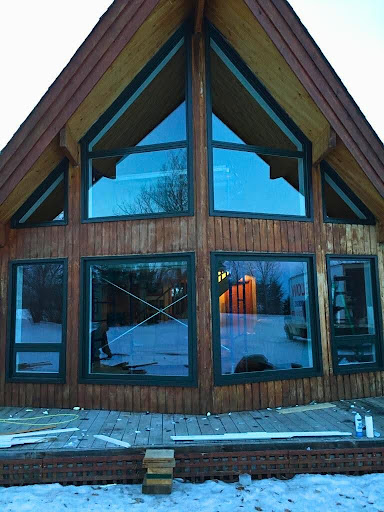 As a Canadian homeowner, you know how important it is to keep your home warm and comfortable during the harsh winter months. One of the most effective ways to do this is to make sure your home is properly insulated. A well-insulated home can save you money on your energy bills, reduce your carbon footprint, and keep you and your family comfortable all year round.
As a Canadian homeowner, you know how important it is to keep your home warm and comfortable during the harsh winter months. One of the most effective ways to do this is to make sure your home is properly insulated. A well-insulated home can save you money on your energy bills, reduce your carbon footprint, and keep you and your family comfortable all year round.
One of the key elements of home insulation is windows. Old or poorly insulated windows can cause heat loss, drafts, and high energy bills. Replacing your windows with energy-efficient ones can save you money on your utility bills, reduce your carbon footprint, and keep your home comfortable all year round.
This article explores how window replacement can affect the insulation of Canadian homes. It explains the benefits of energy-efficient windows, how they work, and what you need to know before replacing your windows. Whether you are an experienced homeowner or a first-time homebuyer, this article will provide you with the information you need to make an informed decision about home insulation. Stay tuned!
The Science of Home Insulation
According to the National Insulation Association of Canada, there are four main types of home insulation used in attics and wall cavities in Alberta fiberglass, mineral wool, cellulose, and spray foam.
Fiberglass is used to make fiberglass insulation, which is available in rolls, batts, and loose fill. Mineral wool insulation is made from rock or slag fibers and is available in batt, roll, or loose fill form. The raw material for cellulose insulation is recycled paper goods and is available in loose-fill form. Styrofoam insulation is made from polyurethane and is available in open-cell and closed-cell forms.
The purpose of insulation is to resist airflow while regulating indoor and outdoor temperatures. When insulation is installed in walls, attics, and basements, it acts as a barrier to areas where the temperature differs from the interior living space. It prevents external temperatures from entering the home through the walls and roof, while at the same time preventing internal temperatures from escaping, keeping the home comfortable all year round.
Insulation efficacy is determined by the R-value of the material, a rating that determines how well the insulation can resist heat flow; the greater R-value, the better the insulation is at preventing heat loss. Using the right type of insulation can create a more comfortable and stable indoor environment and significantly improve the energy efficiency of your home.
The Importance of Home Insulation
Insulating a home is an important factor in maintaining a comfortable and energy-efficient home. Proper insulation can help you save money on your energy bills and reduce your carbon footprint. The US Department of Energy estimates that heating and cooling account for over half of a home’s energy costs. Homeowners may save up to 15% on heating and cooling expenses alone and an average of 11% on overall home energy expenditures by sealing air leaks and adding insulation. The Environmental Protection Agency estimates that the average homeowner can save up to $200 per year by insulating attics, crawl spaces, and basement rim joists.1 In colder regions, such as climate zones 6 and 7, savings can be up to 20%.
Small air pockets are trapped by insulation, which slows the flow of heat into and out of a house in the summer and winter. An insulation’s efficiency is determined by its ‘R-value,’ which is a numerical figure that indicates how resistant the insulation is to heat transmission. Proper insulation not only reduces heating and cooling costs but also increases comfort by keeping homes warmer in winter and cooler in summer.
In summary, insulating your home is a smart investment that can save you money, reduce your carbon footprint, and improve the comfort of your home. Insulating and sealing air leaks can make your home more energy efficient and reduce your utility bills.
The Impact of Window Replacement on Home Insulation
Windows plays an important role in maintaining a home’s insulation. Older single-pane windows are known as poor insulators, leading to heat loss and higher utility bills. Energy-efficient windows, on the other hand, are designed to minimize heat transfer and maintain a comfortable indoor temperature. Windows usually have many glass panes with insulated gasses like argon or krypton positioned between them. This design reduces heat loss and prevents cold air from entering the room. In addition, energy-efficient windows often have (Low-E) low emissivity coatings that reflect heat back into the home in winter and keep heat out in summer. Replacing old windows with energy-efficient ones can result in significant energy savings and a more comfortable living environment According to the Efficient Windows Collaborative, replacing old double-glazed windows with energy-efficient ones can save up to 15% on annual energy bills. The Energy Saving Trust also points out that energy-efficient windows can reduce the amount of heat lost to the outside, lowering energy bills and helping to keep homes warmer in winter.
The Cost of Window Replacement
According to an article in Forbes Home, window replacement costs vary depending on the material, type, and size of the window. The average cost of replacing a window ranges from $450 to $1,400 per window, including labor costs. The most affordable replacement cost is for aluminum windows, ranging from US$300 to US$800. Replacing 25 windows can cost US$18,000 to US$20,000.
To determine whether window replacement is worth the cost, consider the following factors
- Energy efficiency: replacing old windows with new ones can reduce electricity bills by preventing heat loss in winter and heat gain in summer. Energy-efficient windows can also help reduce your home’s carbon footprint.
- Comfort: new windows reduce drafts and noise, making your home more comfortable.
- Aesthetics: new windows make your home more beautiful inside and out.
- Maintenance: new windows require less maintenance than old windows.
If your existing windows are damaged, difficult to open, or have poor insulation, it may be time to replace them. According to Windows on Washington, window replacement is a good return on investment. You can recoup about 70-80% of the cost in the market value of your home. However, the specific value of window replacement depends on your local market and the type of window or window frame you purchase.
The Process of Window Replacement
Below are the steps involved in replacing a window:
- Measure the window: the first step is to measure the dimensions of the existing window frame. This will determine the size of the new window to be installed.
- Selecting the window: Once the dimensions have been determined, select the type of window you want to install. There are several options available, including double-hung, casement, and sliding windows. It is best to choose windows that are energy efficient, durable, and fit your budget.
- Removing the windows The next step is to remove the old windows. This involves removing the sash, frame, and other components attached to the window.
- Window installation Once the old window has been removed, install the new window. Fit the window into the frame and secure it in place.
- Finishing the windows: The last step is finishing the windows. This includes adding insulation, caulking, and trim to make sure the windows are properly sealed and insulated.
When choosing a contractor for a window replacement project, it is important to consider the following factors
- Experience: Look for a contractor with experience in window replacement. The contractor should be able to provide references and samples of workmanship.
- Qualifications: Choose a contractor that is accredited by a reputable organization. This ensures that they have the necessary skills and knowledge to complete the job.
- Guarantee: Make sure the contractor offers a guarantee for their work. This will give you peace of mind in case of an emergency.
Canglow is a reputable window replacement company that offers high-quality windows and installation services. With a wide variety of window styles and materials to choose from, including vinyl, aluminum, and wood, Canglow windows are energy-efficient and come with a lifetime warranty. They also offer a professional installation service to ensure the windows are properly installed and sealed. More information about their products and services can be found on their website at canglow.ca.

